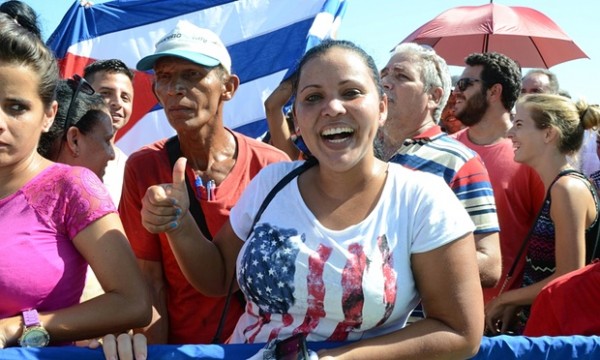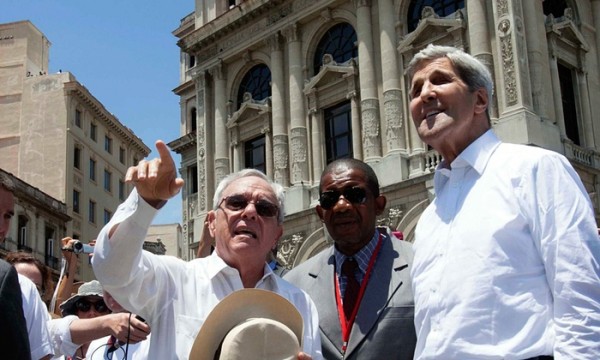
Speaking on Friday before the raising of the Stars and Stripes at the newly reopened US embassy, US secretary of state John Kerry called for systemic political change on the island, a topic that had remained taboo here despite a series of economic reforms and the re-establishment last month of diplomatic ties with the US that were severed during the cold war.
“We remain convinced the people of Cuba would be best served by genuine democracy, where people are free to choose their leaders,” Kerry said, going on to call for responsive institutions and independent civil society in this single-party state.
His speech was broadcast live on state television and radio and re-broadcast on state television in its entirety on Friday night, then reprinted word-for-word on Saturday morning in Granma, the official Communist Party newspaper.
In a series of interviews across Havana, Cubans said they welcomed Kerry’s call, openly discussing their desire for more democracy without the requests for anonymity or slow measuring of words that once were nearly universal.
“Of course we Cubans aspire to more democracy, more liberty and more of everything, because the truth is that life here is really hard,” said Roger Granado, a 44-year-old masseur from the working-class Cerro neighbourhood.
Barack Obama made a milder call for change in Cuba when he announced the new US policy of engagement on 17 December, in a speech that was also broadcast live on state TV.
In 2002, former president Jimmy Carter addressed Cubans in an unprecedented hour of live, uncensored television – telling them their country did not meet international standards of democracy and repeatedly promoting a grass-roots campaign for greater civil liberties.
Shortly after that 2002 broadcast, a 22-year-old woman selling black market cigars to tourists in Old Havana would only give her first name, Alejandra, when she was asked her opinion of Carter’s call for greater liberties.
“People are afraid to talk openly about these things,” she told an AP reporter. “We’re not sure what we can say anymore without getting in trouble.”
On Friday night, stopping as he strolled through Old Havana, 50-year-old nurse Esbaldo Rodriguez shared his name and occupation before confidently saying: “I think it’s logical that Kerry talks about those ideas, democracy, et cetera.”
“For us it’s a drop of hope; it’s something we weren’t expecting.” Rodriguez said. “It’s logical and for me it’s like a dream, what happened today and on 17 December, and now we have to wait to see it become reality.”
Sofia Granda, a 62-year-old retired state worker, agreed: “Everything he said about liberty, human rights, democracy, didn’t surprise me and I like it,” she said, after watching Kerry walk through Old Havana on Friday afternoon.
Retired Cuban diplomat Carlos Alzugaray said Friday’s events “had a great impact on people, who became enthused and started talking much more easily about those themes” of democracy and liberty.
Cubans have felt increasingly free in recent years to complain about the country’s stagnant economy, bureaucracy and the difficulty of life in a centrally planned economy. Far less common are open complaints about Cuba’s leaders and its political system, which allows people to vote directly only for low-level municipal posts.

The Cuban government rejects US calls for political change, citing the long history of American interference with Cuban domestic affairs and blots on the US’s own record on civil liberties.
Addressing reporters with Kerry after the ceremony, foreign minister Bruno Rodriguez cited US human rights transgressions – from police shootings of black men to mistreatment of prisoners at Guantánamo Bay, the US naval base on Cuba that the government says must be returned.
By Saturday morning, as the giddy reaction to the flag-raising ceremony wore off, many Cubans were leavening their praise of Kerry with criticism of the US that echoed Rodriguez.
“What happened yesterday was transcendental, that’s true,” said Rolando Quevedo, a 67-year-old retired driver for a state company. “But I don’t like the cynicism of the Americans when they come here to talk about human rights and democracy.
“What are they talking about? What are the rights of the blacks they’ve killed in these past months?”
Quevedo continued: “Let the Americans come and bring the good but not the bad. The majority of Cubans don’t want to change our system.”
The Guardian

Leave a Reply
You must be logged in to post a comment.